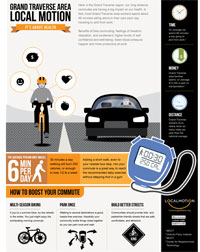Transportation costs in the Grand Traverse region are sky-high. In fact, the average family spends about $15,000 a year on transportation alone, according to the Center for Neighborhood Technology.
With these mounting costs, many families have to choose between filling up their gas tanks or buying essential items like food, shelter or clothing.
This week, the Michigan Land Use Institute released a fact sheet to illustrate exactly how much money we’re spending on transportation in the region, and the cost of owning that second car. We looked at data covering Antrim, Benzie, Grand Traverse, Leelanau, Kalkaska, and Wexford counties.
It’s the second fact sheet in a series that describes the impact transportation habits have on our time, wallets, and health. The sheets are part of Local Motion, a new northwest Michigan program for improving transportation choices in the Grand Traverse region.

|
| Local Motion: It’s About Money |
Just compare:
According to AAA, the annual cost of owning a car in the Grand Traverse area is around $9,000 a year.
Meanwhile, the average tuition at Northwestern Michigan College is $7,500 a year.
The average family vacation costs $4,000 a year.
An extra $115 a week to spend on groceries means $6,000 a year.
Of course, it’s unrealistic to expect every two-car family to drop their second car. Many of us live far away from our jobs, schools, and stores, and we depend heavily on four wheels to get around.
Still, dropping that second car allows some families to trim costs and live closer to downtowns where they can walk, bike, and ride a bus to where they need to go.
Dropping a car isn’t the only way to help your budget. There are other ways to cut costs and boost your commute:
Carpooling three out of five days a week could save you nearly $1,700 annually—and you may even enjoy the ride or get a raise. In fact, one study showed that those who share rides with coworkers in a car or bus get promoted more often because of the bonds created through job networking.
Employers can provide short-term car or bike rentals for attending meetings or running errands so you can leave your car at home. Many employees in the Grand Traverse area would bike or ride the bus to work if there was a car available for running errands.
Communities can build new homes near bus lines and safe bike routes so people don’t have to depend on their cars to get around.
Through Local Motion, we’re dedicated to helping companies figure out how they can offer more transportation choices to their employees. If you’re interested, contact me to figure out how we can help.
Click here to see the first fact sheet.
James Bruckbauer is the Michigan Land Use Institute’s transportation policy specialist. Follow him on Twitter at @jimbruckb. Reach him at james@mlui.org.





